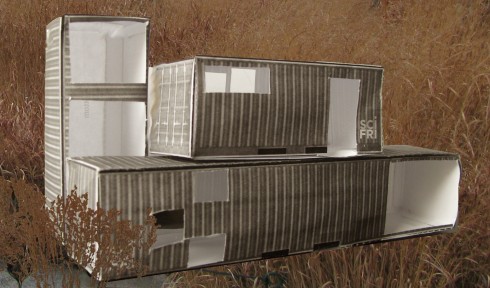Grade Level
6 - 8
minutes
15 min - 1 hr
subject
Mathematics
Activity Type:
design challenge, ratios and scale, Common Core Math activities
Shipping containers, also called freight containers or intermodal containers, are large, reusable steel boxes typically used to transport materials and products all around the world. They are durable, watertight, and stackable, making them easy to transfer between boats, trains, or trucks. Although these huge boxes have been used in the shipping industry for more than 60 years, only recently have homebuilders begun converting them into finished homes.
Watch the video below to learn about a couple who built a home out of shipping containers in Brooklyn, New York. Next, design and build a 3D scale model of a shipping container home using printed cutouts. Use these models to practice basic calculations of ratio, volume, and surface area to estimate the amount of flooring and paint needed, and what size windows and doors to include. Send a picture of your original design to educate[at]sciencefriday.com for a chance to be included in the activity slideshow.
Safety Considerations: Practice common-sense safety with scissors, glue, and tape dispensers.
“Living Inside the Box,” by Flora Lichtman
Materials Needed
2-3 copies of Shipping Container Cutout (pdf) printed on standard copy paper.
Scissors
Clear tape or glue sticks
Optional: Printed “Student Calculations Worksheet”
Optional: Calculators, markers, or toothpicks for embellishing finished models
Shared Standards and Lesson Guide:
Educator Lesson Guide – Shipping Container Homes
Next Generation Science Standards
Define a simple design problem reflecting a need or a want that includes specified criteria for success and constraints on materials, time, or cost.
Common Core State Standards
CCSS.Math.Content.7.EE.B.4
Use variables to represent quantities in a real-world or mathematical problem, and construct simple equations and inequalities to solve problems by reasoning about the quantities
CCSS.Math.Content.7.RP.A.1
Compute unit rates associated with ratios of fractions, including ratios of lengths, areas and other quantities measured in like or different units.
CCSS.Math.Content.7.G.A.1
Solve problems involving scale drawings of geometric figures, including computing actual lengths and areas from a scale drawing and reproducing a scale drawing at a different scale.
CCSS.Math.Content.6.NS.B.3
Fluently add, subtract, multiply, and divide multi-digit decimals using the standard algorithm for each operation
CCSS.Math.Content.6.G.A.4
Represent three-dimensional figures using nets made up of rectangles and triangles, and use the nets to find the surface area of these figures. Apply these techniques in the context of solving real-world and mathematical problems.
Meet the Writer
About Ariel Zych
@arieloquentAriel Zych is Science Friday’s director of audience. She is a former teacher and scientist who spends her free time making food, watching arthropods, and being outside.
